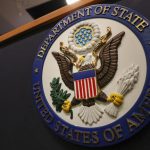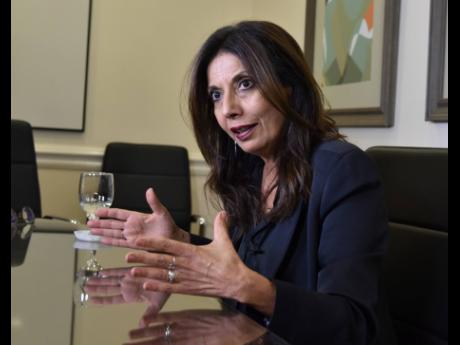UN special representative calls on Jamaica, rest of the globe to take decisive action to protect youth
From child soldiers in some African nations to forced marriages of girls, some as young as eight years old, in the Middle East, United Nations Special Representative for Violence Against Children, Dr Najat Maalla M’jid, believes the current world in which children live is a danger to them.
Following a long day of meetings with lawmakers, other government officials and advocacy groups, Dr Najat Maalla M’jid arrived in the Courtleigh Hotel boardroom on Thursday evening a little tired but losing none of the fire required to stare at and stare down obstacles for a better world for children.
During an interview with The Sunday Gleaner while on a full-schedule official visit to Jamaica last week, Dr M’jid said the current space is not only cruel to children, but is causing them to be cruel to each other.
She was unequivocal when asked if the world was dangerous to children, and especially in light of recent reports from the international KidsRights organisation that some one billion children across the globe are at “extremely high risk” due to climate change harms, and that youths’ living standards failed to improve in the last decade.
“Yes! And I think one billion is an estimation that was made before the (COVID-19) pandemic. And the pandemic, the ongoing humanitarian crisis, conflicts, climate crisis, food insecurity, political instability, and huge displacement of population and children really make this number, I think, more than that,” Dr M’jid told The Sunday Gleaner.
That awful world includes Jamaica, which has been harming its children for decades, and though steps have been made towards protection, more is needed on a sustained and consistent basis, said the Moroccan paediatrician, who was in Jamaica to meet and lobby policymakers, security personnel, advocacy groups and non-profits.
A CYCLE OF VIOLENCE
Children are exhibiting the cycle of cruelty meted out to them, from homes to schools, and in public thoroughfares. Now children are in many instances becoming their worst enemies, doing the same things to each other as is done to them. This year, there have been several incidents of violence in schools among students, some leading to death.
Noting that much of the children-on-children violence was because of hopelessness, as a result of a “loss of a sense of belonging”, Dr M’jid said Jamaica and the world must be consistent with provisions to help children be better versions of themselves instead of hurting each other.
She also wants an end to corporal punishment.
“This is important. I can tell you that it impacts on mental health and well-being. We can indicate in a positive way by dialogue without violence,” she expressed.
Five years ago, UNICEF’s global report, ‘A familiar Face: Violence in the Lives of Children and Adolescents’, revealed that worldwide children experience violence across all stages of childhood and in all settings.
Statistics from the Jamaica Constabulary Force (JCF) showed then that 47 children were murdered between January 1 and October 21, 2017, and in the same period in 2016, 32 were murdered.
The Secret Gardens, a monument erected in downtown Kingston in 2008 to record the names of children killed under tragic or violence circumstances since 2004, ran out of space in 2017.
At the alarming rate at which children were being killed in Jamaica, plans were made to extend the monument for additional names.
Today, the dangerous situation for children has worsened, not just in Jamaica, but globally. Youth are also suffering as a result of toxic climatic practices.
“To be very frank, no country is immune and no child is immune, because we have many forms of violence. It could be physical, sexual, emotional, online; it could be during humanitarian settings, in the circle of trust like domestic violence or intimate partner violence. The fact that children really also are exposed, are witnessing violence is impacting them. So no country is immune and no child is immune,” Dr M’jid stated.
On Thursday in Jamaica Rushane Barnett, the man who murdered his cousin Kemisha Wright and her four children in June in Cocoa Piece, Clarendon, was sentenced to life imprisonment and must serve 61 years before becoming eligible for parole. The ages of the children whose throats he slashed were 23 months, five years, 11 years and 15 years.
The United States, where multiple school shootings over the years have led to the murder of scores of children, is the only country that has not ratified UN Convention on the Rights of the Child, noted Dr M’jid.
In Africa, all nations have ratified the African Charter on Child Rights. However, lack of opportunities has led many youngsters to join terrorist organisations and warring gangs.
Locally, criminal gangs are recruiting boys from a young age, with many targeting schools as recruitment grounds.
Until governments act decisively, slavery, trafficking, child labour and other harmful practices deleterious to children will continue, she said.
TOO MUCH TALK, NOT ENOUGH SUBSTANCE
“You have some countries where there is less (violence) because you have violence protection and violence prevention in place. This is really important to put in place, and to take into account,” she explained.
However, Dr M’jid said where the Caribbean region fails in violence prevention and protection efforts for children, is that there is a lot of talk, but not enough substance.
Speaking specifically to Jamaica’s Child Care and Protection Act, which was enacted in 2004 to strengthen protection for children and promote their rights, she said there are many policies that have been adopted as well as many commissions in place. However, her biggest concern was the gap between adoption and effective implementation.
“So the big problem is effective implementation of all this commitment and all this reform. And this is the big challenge worldwide, not just your government,” said Dr M’jid.
“Let’s stop talking. Let’s stop meeting. Let’s act for every child and stop finding excuses that it is a lack of coordination, lack of resources. We need to see spending on children and people-centred development, and fighting violence as strong investments with high returns, because the cost of inaction is really high.”
She continued, “It’s not only human cost because we know the long-lasting impact of violence against children that could remain in adulthood and could impact the future generations. But at the same time it’s a huge economic cost, around eight per cent of the global GDP (gross domestic product). So if you are investing and doing things in the good way and start at the early age, making sure that the environment is safe, inclusive, empowering, you are going to have a high return on investment, to make economic sense, economic return and at the same time you can invest in other services,” she reasoned.
According to Dr M’jid, a good approach is to make several types of investments that are embedded in national budgets and not wholly dependent on donor funds.
CHILDREN ARE THEIR BEST ADVOCATES
While advocacy must be sustained, “I think the best advocates are children themselves,” Dr M’jid noted.
“They are the best experts in the world, because they know what is working and what is not working. And in many countries worldwide, including Jamaica, they are taking the initiative. They are providing peer-to-peer support, supporting their community. So just bring them on board, they are the best advocates,” she told The Sunday Gleaner.
Policymakers, she said, should stop saying they are investing in children for the future, “We need to invest in children now.”
Sexual exploitation, child marriages and genital mutilation were also of grave concern, she said, adding that children are the victims of cultural cruelty in some parts of the world. These are rooted in some religious and cultural behaviours and practices that are justified by those perpetrating them. But it has a big cost.
“You have early pregnancy, lack of education, problems between girls and their children and you have more than half of the population that is out of the system,” said Dr M’jid, adding that it was a human right imperative to invest in human capital.
She said change must be made to the patriarchal culture that has become normalised, calling for the world to acknowledge its harmful practices. She said all countries have positive social norms and focus should be placed on those.
To the Jamaican government, Dr M’jid said, “Please accelerate. Stop having many commissions; stop having things. Just do it. You know what to do, you know how to do it, you know the challenges better than me, so just do it.”










